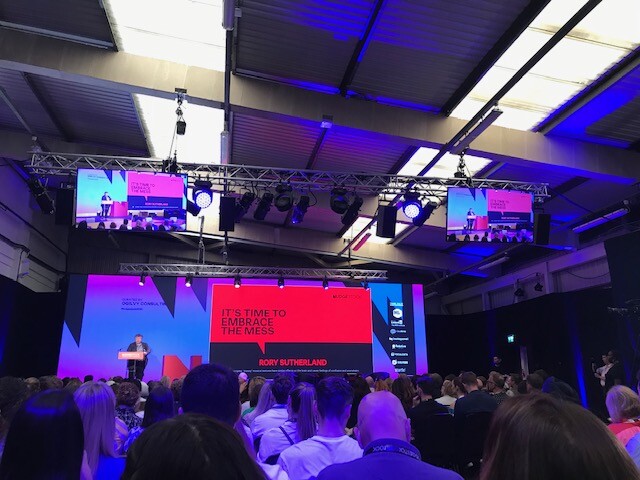
Messy Notes from Nudgestock '23
Just over a week since Nudgestock ’23, and I’m stealing a moment while my husband and 1-year-old eat a messy breakfast to write down the messy thoughts still rattling around my messy noodle.
If you haven’t guessed, this year’s theme was ‘Mess’, and how behavioural science can help to make our brains and the world less messy places. Hallelujah.
Here’s what stuck with me.
1. Our industry doesn’t know how to answer the AI challenge… yet.
Creative businesses are painfully aware that clients are questioning whether AI can help them cut their agency costs. But rather than rail against the future, we need to find a way to work with AI responsibly to enhance our services. Rory Sutherland gave us a cautionary tale to think on:
AI has a better bedside manner than some doctors, at least in writing. In a study published in Spring, AI written responses scored as higher quality and more empathetic than real doctors’ letters. Wild.
But here’s a great example of where I see BeSci drawing on AI ethically and for the power of good… scale. The millions of auto-generated letters chucked out into the world every day could be boosted with a BeSci-informed AI and vastly improved at scale and quickly. From explaining a change in your mortgage payment to increasing attendance at vital health check-ups, these comms matter, and AI could be the key to making them infinitely more effective.
And banks, I’m looking at you. Financial providers currently wrestling with the new Consumer Duty regs have a huge opportunity to work with creative partners using AI responsibly to take BeSci principles and scale them to lead customers to better understanding, and away from financial harm.
Nudgestock gave a great opener to the AI conversation, but with only one session in the packed schedule dedicated to such a big topic, I’d love to see more about ethical integration of AI in Behavioural Science next year.
And one crucial question remains to be answered: if AI is learning from our prompts, we’re building AI that’s as messy as we are… so, how do you build an unbiased AI?
2. You’ve got to know where you’re nudging people to… otherwise it gets messy
Ogilvy presented some hot-off-the-press work they’ve been doing with the Mayor of London’s office to tackle misogyny. In a compelling presentation, they talked through some of the hard-hitting stats around Violence Against Women and Girls, and how the COM-model helped them to apply behavioural science to create a campaign calling on male allies to call out misogyny and sexism with one powerful word: MAAAAAAAATE.
A great concept, with huge potential for meaningful behaviour change. But in working with survivors of domestic abuse to inform our @She’s Worth It project, we know that typically, perpetrators who are challenged in public may well appear to take it on the chin in the moment, but it’s not uncommon for them to then take out the perceived humiliation on their partner when they get home.
One of the guiding principles keeping us all honest in the behavioural science sector is that any intervention should lead to predictable behaviour change; and by that I mean we should know what people are most likely to do as a result of our nudgy creative. So, while there’s no doubt this campaign will see some fantastically positive results, it’s a high-stakes example of where great ideas have the potential to drive unintended behaviour, too.
3. Copy & TV isn’t sexy. And I’m delighted about it.
Nudgestock is part science, part party, and it shines a light on the best in psychology-informed creative from across the world. Part of me always feels sheepish during the inevitable networking small talk, because as a BeSci communications agency working mostly with banks, charities, and the government, how can we hold a candle to the sexy creative titans at Ogilvy?
But embracing the mess this year has actually really helped me tidy something up in my mind: we’re never going to be the agency you come to if you want to sell something. And not only is that okay… it’s bloody great.
We’re specialists in one thing: applying behavioural science to communications that matter. The ‘boring’ bits. The bank post. The greener commute. The pension questions.
We’re experts in prompting good everyday decisions. And that’s pretty sexy to me.